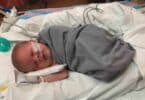If your child is having trouble sleeping or exhibits signs of sleep problems, your child’s doctor may not be much help. It’s not that they don’t want to help. They just don’t have the proper knowledge to do so. That’s what the results from a recent national survey indicated.
The survey, in the form of a questionnaire that contained basic questions about how they handled sleep in their practices along with eight true/false questions about sleep, was sent to 700 different general pediatricians. Of those 700, 349 responded.
While it was found that three-quarters of the physicians ask their patients about sleep problems and more than half asked about sleep-related problems like bedtimes, snoring and bedwetting, only 19.1 percent were able to answer five out of the eight questions correctly. The average number of questions answered right? Three.
“Knowledge is lacking,” study researcher Ramalinga Reddy, doctor at the Children’s Pulmonary/Sleep Center at Mercy Children’s Hospital in Toledo, Ohio said. Medical schools and residency programs fail to provide training for childhood sleep problems.
Reddy’s institution has started holding sleep lectures for pediatricians, making the knowledge available but even this isn’t a perfect solution. Helping patients with sleep doesn’t pay for doctors since insurance companies don’t reimburse doctors for conversations with their patients.
Sleep problems, while considered more of an adult condition, plague children as well. Studies on sleep problems have indicated that somewhere between 10 and 33 percent of children struggle with sleep issues. Around 40 percent of adolescents have trouble sleeping.
Sleep problems can include insomnia, snoring, wakefulness at night and even sleep apnea – a condition that causes cessation of breathing at night. Sleep problems can lead to fatigue during the day. Fatigue during the day can cause a slew of problems that range from asthma, obesity, inattentiveness, trouble with motor skills and even irritability.
Reddy says that pediatricians should receive more formal training opportunities in sleep problems – training that starts in medical school and carries on through the life of their careers. He also feels that, “Politicians and the health care industry need to look into this and provide the proper attention to sleep in children.”
Related Articles:
- Behavioral Disorders Linked to Extreme, Long-Term Morning Sickness in Recent Study
- Toddlers Understand Complex Grammar Study Says
- Could ‘Lazy Parenting’ Change Your Family for the Better?







